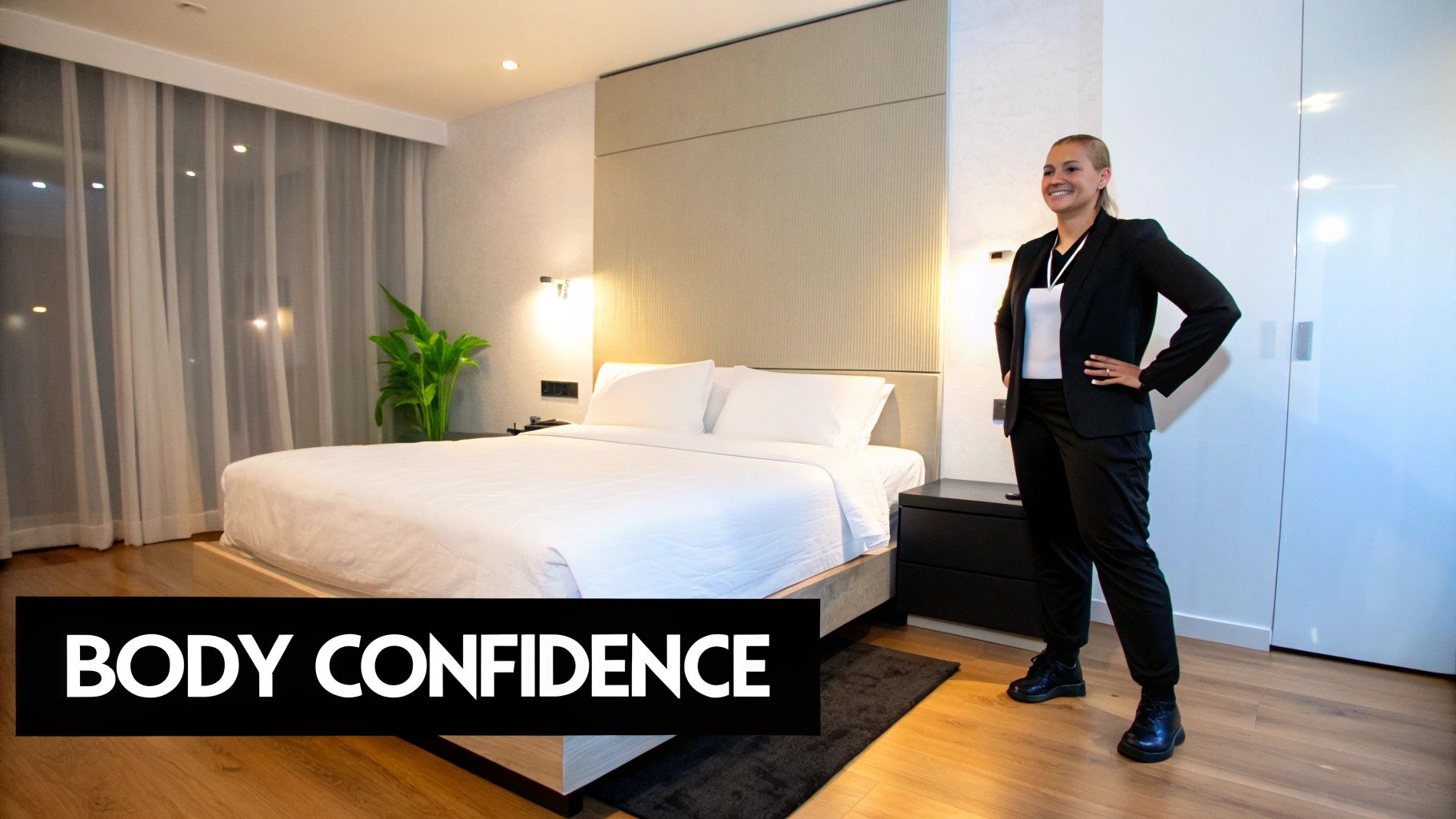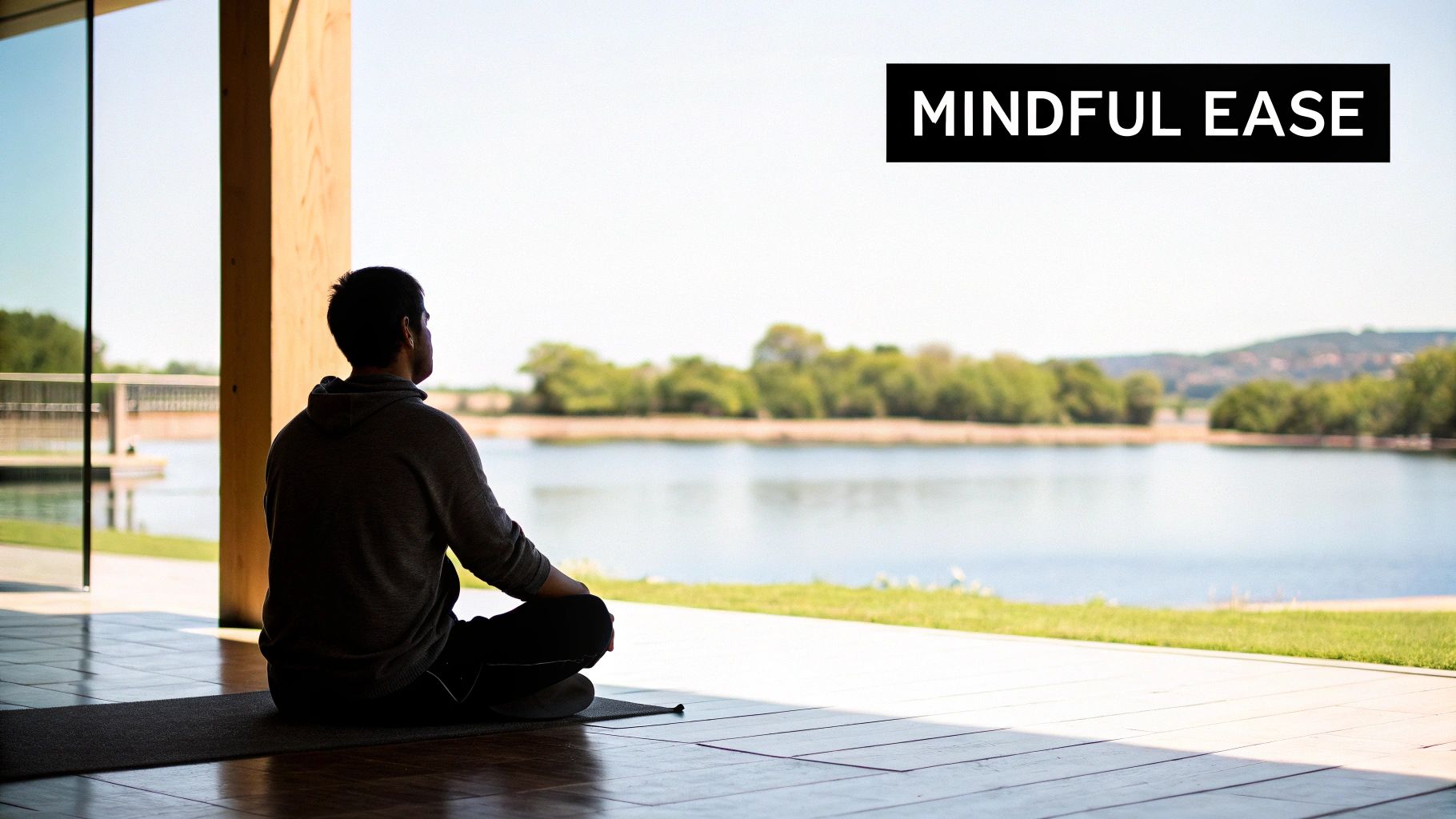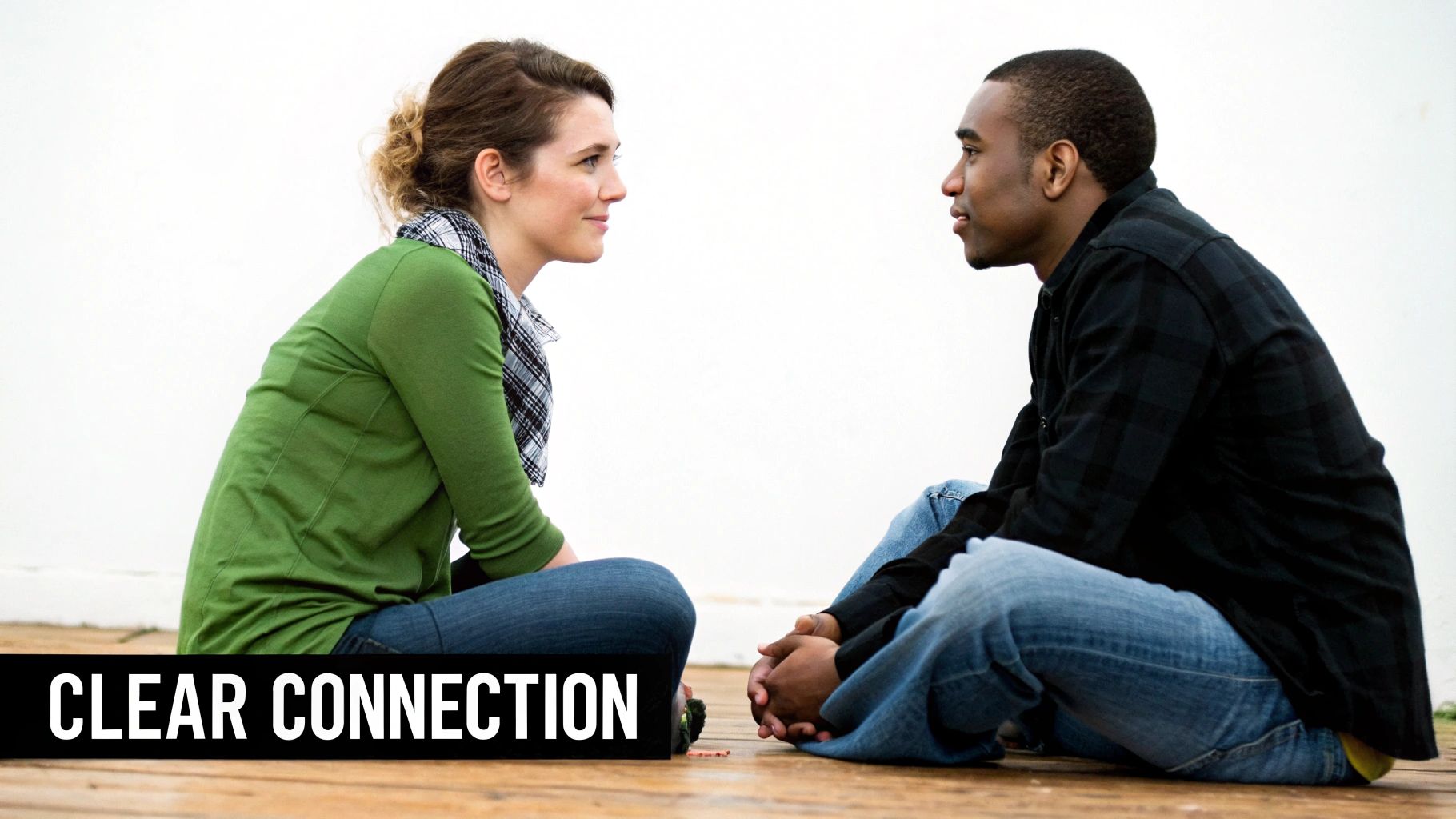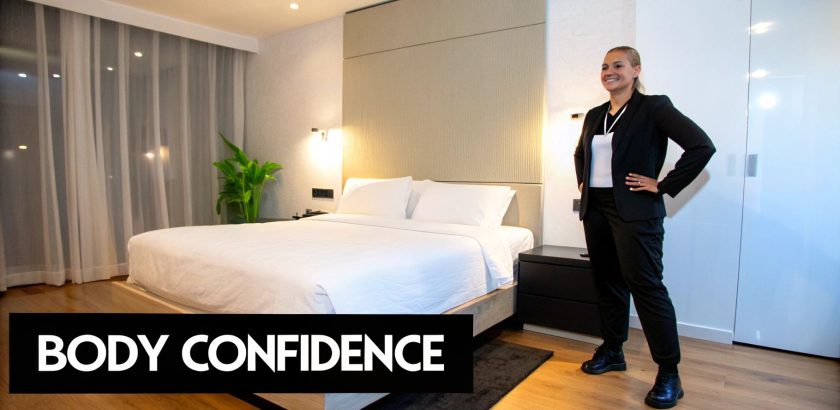The Truth About Sexual Confidence (And Why It Matters)

Let’s be honest: genuine sexual confidence isn’t about achieving some unrealistic ideal or performing perfectly. It’s about something much more profound and rewarding. It’s about feeling truly comfortable and secure with yourself, emotionally and physically, when sharing intimacy.
This inner assurance strengthens your connection with your partner, creating a more fulfilling experience for both of you. It’s about shared exploration and vulnerability, not pressure or anxiety.
Understanding True Sexual Confidence
Many misunderstand sexual confidence, often equating it with outward bravado or a laser focus on “performance.” True confidence in the bedroom, however, is rooted in self-acceptance, open communication, and realistic expectations. This means acknowledging your strengths and weaknesses, expressing your needs and desires honestly, and fostering a safe space for vulnerability with your partner.
Imagine a couple exploring a new sexual experience together. Instead of fixating on doing everything “perfectly,” they prioritize communicating their preferences and discovering what feels pleasurable for each other. This shared journey of discovery strengthens their bond and organically builds confidence. You might be interested in: How to master…
The Impact of Sexual Confidence
Sexual confidence has far-reaching effects, influencing not just your intimate life but your overall well-being. When you feel confident in the bedroom, you’re more likely to experience greater physical and emotional satisfaction.
Furthermore, this increased confidence can extend to other aspects of your life, bolstering your self-esteem and enhancing your relationships. It creates a positive feedback loop, improving intimacy and fostering personal growth.
The Importance of Sexual Wellbeing
Recent data highlights significant improvements in sexual wellbeing. 57% of sexually active individuals report feeling emotionally satisfied, and 56% report feeling physically satisfied. This marks a considerable increase from 2006. This rise in satisfaction may be attributed to increased access to sexual health education and improved mental well-being – both critical components of confidence in the bedroom. Find more detailed statistics here: https://www.reckitt.com/our-stories/2024/global-satisfaction-increased-sexual-wellbeing/
Embracing Your Authentic Self
The path to sexual confidence begins with embracing your true self. This means letting go of unrealistic expectations and accepting your body and desires just as they are. It also involves recognizing that vulnerability is not a sign of weakness, but rather a source of strength that fosters deeper connection.
For additional resources and articles on related topics, explore the Tevello Blog . This journey of self-acceptance is essential for cultivating authentic confidence in the bedroom and lays the foundation for a more fulfilling and genuine intimate life.
Breaking the Silence: Communication That Builds Confidence

Honest and open communication is truly transformative for intimacy. It’s about cultivating a safe environment where both partners feel empowered to express their desires and needs without fear of judgment. This section offers practical advice for building that safe space and navigating conversations that enhance confidence in the bedroom.
Starting the Conversation
Initiating conversations about sex can be awkward. Many people find it daunting, but it’s the cornerstone of deeper intimacy and increased confidence. Starting with simple, non-pressuring phrases can make a world of difference.
Instead of criticizing, try expressing appreciation. Phrases like, “I really loved it when…” or “I’ve been thinking about trying…” can be great conversation starters. These types of openings encourage exploration and create a positive atmosphere.
Focusing on shared pleasure, rather than individual performance, also alleviates pressure and fosters collaboration. Think of intimacy as teamwork, where both partners are working together to discover what feels good.
Navigating Vulnerability
Open communication requires vulnerability. While it can be challenging, vulnerability is essential for building true intimacy and boosting confidence in the bedroom. Learning to express your needs without feeling exposed is a crucial skill.
One effective technique is to frame requests as preferences. Phrases like “I’d love to try…” or “I find I feel more comfortable when…” allow you to share your desires without making demands or implying criticism.
Vulnerability is a two-way street. Being receptive to your partner’s needs and offering reassurance is equally important. This reciprocal dynamic builds trust and deepens your connection.
To help guide these conversations, the table below offers some helpful phrases and things to avoid:
Introduction to table: The following table offers some helpful phrases to start intimate conversations and some phrases that can be counterproductive.
| Conversation Scenario | Helpful Phrases | What to Avoid |
|---|---|---|
| Initiating a new activity | “I’ve been curious about trying… Would you be open to exploring that together?” or “I saw something interesting online… Could we talk about it?” | “We never try anything new.” or “You always say no.” |
| Expressing a preference | “I find I feel more comfortable when…” or “I really enjoy it when…” | “You’re doing it wrong.” or “You never do it like…” |
| Giving feedback | “I loved it when you… Could we do that more often?” or “Next time, maybe we could try…” | “You’re not good at…” or “You always…” |
| Discussing boundaries | “I’m not really comfortable with… Could we try something different?” or “I need to feel more… before we continue.” | “You’re being too sensitive.” or “Don’t be such a prude.” |
Conclusion of table: By using positive and open language, you can create a safe space for deeper intimacy. Avoiding accusatory or critical language can help prevent defensiveness and build stronger communication.
Giving and Receiving Feedback
Constructive feedback is vital for growth in any area, including intimacy. However, delivering feedback in a way that builds confidence, rather than diminishing it, is crucial. Focus on specific behaviors instead of making generalizations.
For example, instead of saying “You’re not affectionate enough,” try “I would love it if we could cuddle more.” This approach makes the feedback actionable and less likely to be perceived as personal criticism.
Be open to receiving feedback from your partner as well. Consider it an opportunity for growth and deeper understanding. This mutual exchange of feedback creates a cycle of improvement and reinforces confidence.
Common Communication Mistakes and Solutions
Certain communication patterns can erode confidence in the bedroom. Criticism, defensiveness, and stonewalling are common culprits. They create emotional distance and block intimacy. Constantly comparing your partner to others or focusing on perceived flaws creates insecurity and undermines self-esteem.
Instead, focus on positive reinforcement and celebrating what works well. This builds confidence and encourages exploration. Learning how to effectively address concerns and navigate disagreements without resorting to blame or defensiveness is key. This creates the safety and trust necessary for both partners to fully express themselves and achieve greater confidence in bed.
Beyond The Mirror: Transforming Body Image Into Confidence

Body image has a significant impact on how confident we feel in intimate settings. It’s easy to get caught in negative thoughts, focusing on perceived flaws instead of enjoying the closeness of the moment. This self-consciousness can affect not only your own pleasure, but also your connection with your partner. Luckily, there are ways to improve your relationship with your body and build real confidence in the bedroom.
Interrupting Negative Self-Talk
One of the first steps toward building confidence is addressing negative self-talk. These intrusive thoughts can appear at the worst times, distracting you from the present and fueling insecurity. Learning to interrupt this cycle is key to feeling more confident.
For example, if you catch yourself thinking, “My stomach looks awful,” try replacing that thought with a neutral or positive one. This could be something like, “I’m grateful for my body and all it can do,” or simply focusing on the sensations you’re experiencing.
Practicing self-compassion can also significantly improve body image. Treat yourself with the same kindness you’d offer a friend struggling with similar insecurities. This shift in perspective can be powerful.
Appreciating Your Body’s Functionality
We often fixate on how our bodies look, forgetting to appreciate what they can do. Shifting this perspective is essential for building genuine body confidence. Instead of criticizing your appearance, try focusing on the pleasure your body can experience and give.
This means appreciating the sensations of touch, the intimacy of connection, and the shared joy of physical pleasure. This shift can deepen your connection with your partner and enhance intimacy.
A study found that self-esteem and sexual satisfaction are connected, with higher self-esteem often leading to better sexual experiences. Focusing on mental health and self-esteem can greatly improve confidence and satisfaction in intimate settings. Learn more about this correlation: https://www.reckitt.com/our-stories/2024/global-satisfaction-increased-sexual-wellbeing/
Mindfulness In Intimate Settings
Mindfulness techniques, adapted for intimate moments, can be helpful. These practices allow you to stay present with your partner, reducing anxiety and enhancing connection.
Simple breathing exercises can ground you in the moment, interrupting negative thoughts. Focusing on the physical sensations you are experiencing, rather than perceived flaws, can also help you stay present and connected.
Sharing Insecurities With Your Partner
Talking to your partner about body image concerns can be difficult. However, creating a safe and supportive environment for open communication can strengthen your relationship and deepen intimacy.
Start by expressing your feelings with “I” statements, focusing on your experience. For example, instead of saying, “You make me feel self-conscious,” try, “I sometimes feel insecure about my body.” This encourages understanding and empathy.
Creating a space where both partners feel comfortable expressing vulnerabilities can foster genuine confidence and deepen intimacy. This mutual support can be transformative for building confidence in the bedroom, leading to a stronger and more fulfilling connection.
The Knowledge Gap: How Learning Builds Sexual Confidence

Confidence in the bedroom often comes from a deep understanding of the physical and emotional aspects of intimacy. This understanding lays the groundwork for genuine self-assurance, replacing anxiety with excitement. This section explores how knowledge about anatomy, pleasure, and sexual techniques can empower you to approach intimacy with more confidence.
The Power of Anatomical Knowledge
Understanding the intricacies of your own body, as well as your partner’s, can significantly enhance your intimate experiences. This knowledge goes beyond the basics, exploring the nuances of pleasure and response. Knowing the different erogenous zones and how they respond to various types of stimulation can unlock a new level of exploration and shared pleasure.
Learning about the physiological responses involved in arousal and orgasm can also demystify the process and reduce performance anxiety. This foundation of anatomical knowledge can be a pathway to greater confidence and more fulfilling intimacy.
Embracing Self-Discovery and Partnered Exploration
Self-discovery is crucial for building confidence in bed. Understanding your own body and what brings you pleasure is essential for communicating your needs and desires to your partner. This knowledge empowers you to guide your partner, leading to a more collaborative and satisfying experience for both of you.
Exploring your sexuality, both solo and with a partner, opens doors to increased pleasure and confidence. For further exploration, you might find this helpful: Exploring more resources.
Reliable Resources for Expanding Your Understanding
Many resources are available to expand your understanding of sexuality, going beyond the often limited and sometimes misleading information found in mainstream media. Reputable websites, books, and workshops led by certified sex educators can provide accurate and comprehensive information.
These resources cover a wide range of topics, from anatomy and physiology to communication and sexual techniques. This readily available information offers valuable learning opportunities, no matter your background or previous education.
Addressing Cultural Influences and Knowledge Gaps
Cultural influences often shape our understanding of sex, sometimes creating knowledge gaps and perpetuating misinformation. These gaps can contribute to insecurity and anxiety surrounding sex. Openly discussing these influences and seeking accurate information can be incredibly beneficial.
An international study examined the impact of various factors on sexual satisfaction and confidence. The study found that homosexual individuals, along with younger people (18-23 years old) and those with higher education, often reported higher levels of satisfaction. You can learn more about these influences here: Impact of Various Factors on Sexual Health .
Learning as a Journey, Not a Destination
It’s important to think of learning about sex as an ongoing journey of exploration, self-discovery, and open communication with your partner. The focus should be on understanding and connection, not on achieving a specific level of “performance.” Embrace the process, and you’ll see your confidence grow as you learn and explore together.
Present Over Perfect: Mindfulness Practices for Intimate Moments
Building on the previous discussion about learning and knowledge, this section explores another key element of how to be more confident in bed: mindfulness. When self-doubt creeps into intimate moments, confidence can quickly disappear. This is where mindfulness techniques, adapted for sexual contexts, become incredibly helpful. They can help you stay present, focused on the connection with your partner, and less worried about performance anxiety.
Recognizing and Redirecting Wandering Thoughts
The first step towards mindful intimacy is recognizing when your mind wanders. These thoughts often drift toward self-criticism, comparing yourself to others, or worrying about performance. This mental shift can disrupt the connection with your partner and lessen the experience.
Recognizing these thoughts is only the beginning. The next step is gently guiding your attention back to the present. Focus on your senses—the feel of your partner’s skin, the rhythm of your breath, the sounds and sensations around you. This helps you reconnect with the intimacy of the moment.
Practical Mindfulness Exercises for the Bedroom
Several mindfulness exercises can be particularly beneficial in intimate settings. Deep breathing exercises are a simple but effective way to calm your nervous system and ground yourself in the present. For example, try inhaling slowly and deeply through your nose, pausing for a few seconds, and then exhaling slowly through your mouth.
Another helpful technique is sensory awareness. This involves intentionally focusing on the physical sensations you’re experiencing. Notice the texture of the sheets, the room’s temperature, and the feeling of your partner’s body. This heightened awareness can quiet the mental chatter and deepen the physical connection.
To help you further explore incorporating mindfulness into intimate settings, the following table offers some specific techniques and their benefits:
Mindfulness Techniques for Sexual Confidence
| Technique | How It Works | When to Use It | Expected Benefits |
|---|---|---|---|
| Deep Breathing | Slow, deep breaths calm the nervous system. | When feeling anxious or overwhelmed. | Reduced anxiety, increased focus. |
| Sensory Awareness | Intentional focus on physical sensations. | Throughout the intimate experience. | Enhanced physical connection, greater presence. |
| Body Scan | Bringing awareness to different parts of the body. | During foreplay or solo exploration. | Increased body awareness, deeper self-acceptance. |
| Loving-Kindness Meditation | Generating feelings of warmth and acceptance towards oneself and one’s partner. | Before or after intimacy, or during moments of self-doubt. | Increased self-compassion, stronger connection with partner. |
These techniques, practiced regularly, can cultivate a more mindful and confident approach to intimacy. Remember, the goal is not to eliminate thoughts or feelings, but to observe them without judgment and gently redirect your attention back to the present moment.
Creating a Technology-Free Space for Connection
Digital distractions are a constant presence, often intruding on even our most intimate moments. These distractions can greatly impact our ability to connect with our partners and feel confident. Creating a technology-free space is essential for fostering genuine connection and confidence.
This might mean silencing notifications, putting phones in another room, or setting specific “technology-free” times. By removing these distractions, you create space for deeper connection, increased presence, and a more fulfilling intimate experience.
Shifting From Performance to Sensation
Anxiety in the bedroom often stems from a focus on performance. We worry about “doing it right” or meeting expectations. Mindfulness helps us shift from performance to sensation and connection.
By being present and attuned to our own bodies and our partner’s responses, we can release the pressure to perform and simply enjoy the experience. This shift naturally enhances confidence. It’s about savoring the journey, not just the destination. This allows for greater vulnerability and deeper intimacy, further strengthening confidence.
Beyond the Bedroom: Relationship Dynamics and Confidence
Sexual confidence isn’t just about what happens in the bedroom. It’s deeply connected to the overall dynamics of your relationship. Trust, emotional connection, and even daily interactions play a vital role in building confidence between the sheets. Nurturing your relationship outside of the bedroom can significantly impact your intimate life.
Relationship Phases and Confidence
Different relationship stages present unique opportunities and challenges to building sexual confidence. In new relationships, the thrill of discovery can boost confidence, but navigating unfamiliar territory can also feel vulnerable. Open communication about desires and boundaries is essential to create safety and trust.
In long-term relationships, established intimacy can be a solid foundation for confidence. However, complacency can become an issue. It’s important to prioritize ongoing communication and exploration. Even in established relationships, making an effort to keep the spark alive can increase confidence for both partners.
You might be interested in: Exploring Attachment Styles and Intimacy
Identifying and Addressing Damaging Patterns
Some relationship patterns can gradually erode confidence. Criticism, emotional distance, and unresolved conflicts create barriers to intimacy. For example, constant criticism about body image or sexual performance can significantly damage self-esteem and hinder confidence. Addressing these issues through open communication, and potentially professional guidance, is crucial for rebuilding a healthy connection.
Nurturing Connection Outside the Bedroom
A strong emotional connection outside the bedroom naturally enhances confidence within it. Shared activities, quality time, and expressions of affection build a foundation of trust and intimacy. Just as a plant needs sunlight and water to thrive, a relationship needs nurturing and connection to foster confidence. This allows for greater vulnerability and deeper intimacy, ultimately strengthening confidence in the bedroom.
Rebuilding Intimate Trust
Challenges and periods of disconnection are inevitable in any relationship. After these times, rebuilding intimate trust is key to restoring confidence. This involves open communication about hurts and needs, a willingness to forgive, and a commitment to rebuilding connection. It means creating a safe space for vulnerability and working together to strengthen the emotional bond.
Being in a relationship or having a sexual partner was associated with higher sexual satisfaction, which can contribute to increased confidence. Interestingly, married individuals often reported lower levels of sexual self-esteem compared to other groups. Explore this topic further: Relationship Dynamics and Sexual Satisfaction .
Practical Approaches for Restoring Confidence
Couples therapists offer practical advice for gradually restoring confidence in healing relationships. This might involve:
- Focusing on non-sexual touch: Holding hands, cuddling, and massage can rebuild physical intimacy without the pressure of sexual performance.
- Practicing active listening: Truly hearing and understanding your partner’s feelings can foster deeper connection and trust.
- Expressing appreciation: Regularly acknowledging and valuing your partner strengthens the emotional bond and builds confidence.
- Scheduling regular date nights: Prioritizing quality time together reinforces commitment and creates opportunities for connection.
By actively working on these aspects of your relationship, you can create a stronger foundation for intimacy and significantly boost your confidence in bed. This integrated approach, addressing both the emotional and physical aspects of your relationship, is key to building lasting confidence and a fulfilling intimate life.
Breaking Free: Cultural Influences on Sexual Confidence
Society shapes our views on sex and, as a result, our confidence in the bedroom. These influences, from media portrayals to cultural norms, often operate on a subconscious level. This section explores these influences and offers strategies for building a healthier and more authentic sense of sexual confidence.
The Media’s Mixed Messages
Movies, television, and advertising frequently present unrealistic depictions of sex. These idealized images can create unattainable standards, fostering feelings of inadequacy and self-doubt. The emphasis on perfect bodies and flawless performances can make real-life intimacy feel awkward or insufficient.
The portrayal of spontaneous, effortless sex can also set unrealistic expectations. This can make planned intimacy feel less exciting or even like a chore. Recognizing how media representations influence our perceptions is the first step towards reclaiming our sexual confidence.
The Pornography Paradox
Pornography presents a complex issue when it comes to sexual confidence. While it can be a source of exploration and fantasy, it frequently portrays unrealistic scenarios and body types. This can distort expectations about sex and fuel feelings of inadequacy.
Pornography’s performative nature can also pressure viewers to replicate unrealistic acts or achieve impossible levels of arousal. This performance-based approach can detract from the genuine connection and pleasure found in authentic intimacy.
Cultural Expectations and Social Pressures
Cultural norms and societal expectations significantly shape our sexual confidence. These unspoken rules often dictate what’s considered “normal” or “acceptable” regarding sexual behavior, desire, and expression. This can be particularly challenging for those whose experiences or preferences fall outside these narrow norms.
Social pressure to conform can lead to shame and guilt. For example, the stigma around sexual inactivity or exploring non-traditional intimacy can make individuals feel inadequate. This can severely impact their sexual confidence. A study on sexual inactivity trends in the U.S. revealed a significant increase, especially among younger men, between 2000 and 2018. The percentage of 18- to 24-year-old men reporting no sexual activity in the past year rose from 18.9% to 30.9%. Learn more: Sexual Inactivity Trends in the US .
Reclaiming Your Sexual Confidence
Building genuine sexual confidence involves challenging cultural influences and defining your own values. This includes:
- Critically Evaluating Media Portrayals: Remember that media doesn’t always reflect reality.
- Setting Realistic Expectations: Intimacy is a journey of exploration and connection, not a performance.
- Embracing Your Individuality: Celebrate your unique desires and preferences; there’s no “right” way to experience sex.
- Communicating Openly With Your Partner: Sharing your needs and desires fosters deeper connection and confidence.
- Seeking Professional Guidance If Needed: A therapist or sex educator can provide support and guidance.
By actively challenging these influences and defining your own values, you can cultivate a more authentic and fulfilling sexual experience. This means letting go of external pressures and embracing your unique journey toward confidence and pleasure.
Ready to embark on a journey of sexual self-discovery? Visit G-Spot 101 for resources and insights to help you build confidence and create a more fulfilling intimate life.
The post How to be more confident in bed: Expert Tips appeared first on G Spot 101 .
Intimate Tickles found this article quite interested, and we thought you might to. We give all the credit for this article to gspot. Click Here To Read This Article From It's Original Source